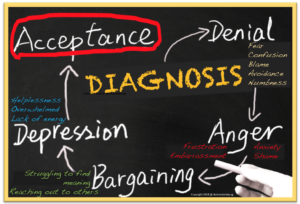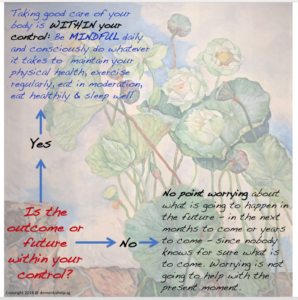Coming to Terms with Dementia: What Would Buddha Do?
One of my students kept asked me this question several times after going through the workshop in which he experienced dementia and learn about dementia: “Why isn’t there somebody to teach people what to with dementia?” I didn’t quite understood him at first. I asked if he’s concerned about someone close to him having dementia, and that he could check out this article “DO I HAVE DEMENTIA?” for signs and symptoms of dementia and what to do to get a proper diagnosis. He repeated the same question again and I repeated myself again, thinking that I am starting to sound like someone with dementia… until he finally said that what he meant was “after the diagnosis, what’s next? Nobody teaches the person being diagnosed what to do or how to accept and come to terms with the diagnosis”… AH! I finally understood what he was trying to say!!! And I immediately thanked him for giving me the ideal for this month’s article. Thank you so much, CJ!
And I started thinking about his question. It is true… being diagnosed with dementia, as we know, can be very disturbing, alarming, worrisome and disabling to one. This is even more so if that person is still relatively young, I’m referring to those diagnosed with the early onset dementia.
“What will happen to me in the coming months, or years?”
“How many more ‘normal’ years am I left with?”
“What is going to happen to my job?” “What is going to happen to my family, my loved ones?” “I’ll become a burden to them!”
The above are all valid concerns after the diagnosis.
Too many times, we look at the person with dementia as a person with dementia but not at the person as the person himself/herself. And I remember reading articles written by 59 year-old Kate Swaffer – CEO and Co-founder of Dementia Alliance International, as well as other inspiring stories shared by other members of DAI. Many people, including the healthcare professionals, at times gave the “It’s the end” message to people diagnosed with, talking about ACP (Advanced Care Plan) and terminal care facilities down the road. But IT ISN’T THE END. People with dementia, especially those in the early stage still possess many of their capabilities and strengths, hence, can still continue living their lives as per before, with some adaptations and help; and they should be nowhere near institutionalised lives. Institutionalised living, living in a nursing home, is very different from our normal way of living due to the rigid routines in place, and of course the place itself, is very very different from our homes and our regular work places. With such messaging and morbid future, it is no wonder that anxiety and depression soon sets in for many after the initial diagnosis, causing their disease to worsen.
How can one come to terms living with a disabling diagnosis like dementia?
Let’s start with Kübler-Ross model on the 5 Stages of Grief with initial denial, anger, bargaining, depression and acceptance.

According to Dr Kübler-Ross, it’s normal to deny the diagnosis upon being diagnosed, feel anxious about the future, to be in angst, or even feel shameful about the diagnosis, while others may struggle to make sense of the diagnosis or some may end up feeling depressed for a while, like Kate Swaffer. Kate was diagnosed with a type of frontotemporal dementia which would progressively affect her language skills, behaviour and movement about 10 years ago. The message that she received from the healthcare professionals was not encouraging, “Get your end-of-life affairs in order and get acquainted with aged care“. If I can quote her, she cried for months after her diagnosis – losing her job and her driving licence was taken away from her as a result of the disease – she was “gloomy about the future… I actually thought that I would be like the late-stage patients I nursed and (deteriorate) really quickly”. As we can see from Kate’s experience, one needs not always start with denial and may not always move sequentially up all the 5 stages.
Kate was taking her master’s degree when she was diagnosed, and she wrote about how that education experience became a critical and positive life-changing experience for her when one of her lecturers said to her: “Oh, you’re just a student with acquired disabilities. We’ve got a whole disability support team. I’ll make an appointment for you.” With her lecturers recording down all the lectures so that she could listen to them, and having her younger classmates helping her with note-taking and navigation around campus, she was able to successfully complete her education, despite living with dementia. That was indeed a critical turning point for her to come to acceptance of her diagnosis, the reality. She got past the crying and gloominess; she started reading up on the disease and do things including making adjustments and adaptations so as to be able to carry on with life as normally as she could, as much like before as possible. Since her diagnosis to now, it is about 10 years, Kate has not only completed a master’s in dementia care and is working on her PhD, but also has authored a few books. We can learn from Kate’s encouraging example, ACCEPTANCE is key to life after being diagnosed with dementia.
And I learned my lessons about acceptance and managing difficult emotions from the Buddha, not literally Buddha himself cos I don’t have the great fortune to be able to sit down for a cuppa with him, but from Buddha’s teachings about expectations about life and in life, acceptance, the concept about sufferings, mindfulness, and how mindfulness helped in managing difficult situations and feelings in life.
I like to borrow a few of Buddha’s teachings for coming to terms with the diagnosis and living life fully after being diagnosed with dementia.
- Is the outcome is beyond your control?

- Live in the present moment. There are quite a few lesson that we can learn from the Lotus plant. The lotus plant is an amazing plant that is able to unfold perfectly clean leaves and flowers out of its environment – the muddy and dirty water. Despite the disabling diagnosis of dementia just like the muddy and dirty water, Kate Swaffer is the author of a few books, has completed her master’s degree and is working on her PhD. She has not let the “muddy and dirty water” disrupt or taint her growth. So can you. Living in the present, focusing on the activity in the present moment helps to distract you from worrying and feeling angst about the uncertain, frightening future. When you are eating, focus on the eating itself; when you read, read. Find activities that are fun and meaningful for you to engage in and focus on doing that activity, you will realise that you don’t really have much time to be in angst.
- Dukkha. The 1 certainty in life: There will be unsatisfactoriness, sufferings, or pain in life. Don’t run away from or try to avoid them, instead let go of your craving for perfection, but to accept this fact. Expect and accept days that you may wake up feeling confused and blank, along with days that you will wake up feeling completely fine as Kate shared in an interview “Some days I struggle dressing, some days I struggle making a cup of coffee or I’ll make five cups and not drink any of them. Some days I feel like the doctors are wrong, there’s nothing wrong with me“. Hence, if you wake up feeling fine, live each and every moment fully and make the best use of each moment engaging in activities that bring joy, happiness and meaning. Yes, one day you will lost your awareness & alertness and will ultimately die, just like everybody else; but that day is not today if you are reading this article! At times, a little adaptation, adjustment or even a little help from others around, just like Kate’s professors and classmates, may be needed for you to live every moment fully. Do so without feeling inadequate, shamed or embarrassed about it just as the lotus flower and its light control behaviour. As a day-blooming plant, the lotus flower opens in the morning, starts to close by mid-afternoon and closes completely at night – adjusting itself according to the amount of daylight in its environment throughout its lifespan. Just like the nature, it is natural to making little adjustment, adaptation or asking for help to continue living your normal life like others living with other diagnosis, other diseases including hypertension and diabetes. There is absolutely nothing wrong with that. Once you are able to accept and expect making little adjustments, adaptations or help (humanly and man-made) here and there, you will find that you are still pretty much able to live life as per normal!
My mummy has mild cognitive impairment, but she is still able to take bus independently to go out for a meal or shopping trip with me. How has she been doing it? She’s been taking bus independently even  to the not-so-familiar destinations with help from a simple app called My Transport & the bus-driver. When I ‘date’ her, I will tell her 4 things:
to the not-so-familiar destinations with help from a simple app called My Transport & the bus-driver. When I ‘date’ her, I will tell her 4 things:
- What bus to take togo to where I will be meeting her
- Landmarks to look out for along the way
- Tell the bus-driver to allow her to alight at the destination
- Call me when she boards the bus
Religiously, she would call me once she boarded the bus, from the app, I knew how long her journey would be and when the bus would be arriving at the bus-stop that I would be meeting her. I would make sure that I arrived at that bus-stop about 10 minutes before the bus arrival time. When the app showed 3-4 mins on the bus-arrival function, I would call her to inform her that she would be alighting soon. She never got lost for our meetings, and from her expression, I can see that she felt good about being able to make her way on her own to our dates.
- Meditate, focus on your breathing if you are in angst, when life gets overwhelming and whenever you have nothing else to do is the last important lesson from the Buddha that I like to share with you in this article. As shared by Kate “I had a good sleep, I meditated as well, that’s really helpful“. Why meditation? Firstly, human brains can only focus on 1 thing at a time, so if you are focused on breathing, you will not be able to dwell on your negative feelings. You will feel better almost instantly. Secondly, MRIs done by several researches had shown the thickening in certain parts of the brain in individuals who do mindfulness meditation regularly.
References:
Nanaa, Y. & Taleb, H. (2015). The lotus flower: biomimicry solutions in the built environment. WIT Transactions on Ecology and The Environment, Vol 193.
The Straits Times. (2017). It Changed My Life: Author, activist and poet living with dementia.